DAD TOLD ME NOT TO COME HOME WHEN I SIGNED FOR PARTIZAN!Dragan Todorić’s life story about basketball, Red Star,change of last name
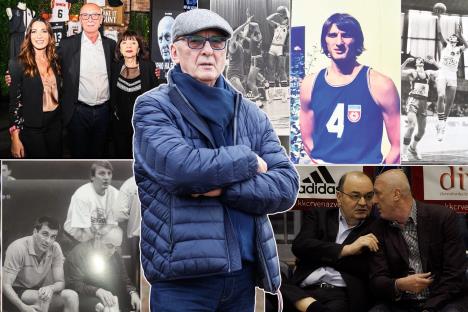
His name is associated with all the titles of Partizan BC. He spent half a century at the club as a player and an official, and won 49 trophies with his team, all the ones that “the steam roller” raised since its inception. Although he had been a Red Star supporter, he dedicated his whole life to Partizan, finding his greatest support in his wife and daughter
As a kid, I liked to be out in the street running after the ball. It didn’t matter whether it was a basketball or a football. We also played ice hockey – we didn’t have ice but concrete, and a spam can instead of a hockey puck.
Childhood
I liked the town of Kraljevo, and I still do, but I have less and less contact with it with every passing year, especially since my parents passed away. My brother Zoran is there – he’s three years younger than me. We like each other, but we always teased each other, like all brothers do. We were always picking on each other. We liked having pillow fights best. When Mom and Dad weren’t there, we’d start fighting like all children. And when the pillowcase would break, the feathers would start flying around the whole house.
My father the general manager
Miodrag, nicknamed Mile, was part of the group that was supposed to be shot in 1941 in Kraljevo, at 16 years of age. He spent a few days at the concentration camp, and he somehow managed to escape. He was in the group of some ten people who avoided being shot. Afterwards he joined the Partisan Liberation Movement. When the war ended, he became recognized as a prominent fighter at a fairly young age. A political party career lay in store for him. He started out as the head of the youth labour actions, and became the general manager of a housing company a few years later. I know him as a general manager too. There was an anecdote about him that he was the only man who started out and retired as a general manager.

Last name
When it became clear that my father was going to have a career in politics in Kraljevo, his colleagues were teasing him about his last name. It was Suvočesmaković. It’s a Montenegrin last name, which he inherited from his paternal grandmother. I don’t know exactly how it happened that he didn’t have his grandfather’s last name. His buddies nicknamed him Mile the Dry Fountain or something like that. At one point he changed his last name, so my brother and I were born having the last name of Todorić.
Hair
I was a scamp, and I didn’t like studying. When I didn’t do my homework or things like that, my father would first punish me by grounding me, and then, as I grew older, a worse punishment came – having my hair cut. It was a time when I was becoming a young boy, interested in girls. I had a full head of hair, you can look at the pictures. I couldn’t say that my father cut my hair and made me look like a billiard ball, so I came up with a story that I’d fallen down and smashed my head, so my grandma put a band aid on it. So I’d wear this band aid on one side for two days, and then on the other on the third day, and that’s where my theory fell through. That’s when I got the nickname Baldie. Now I have no hair, but it’s because it’s gotten thin.
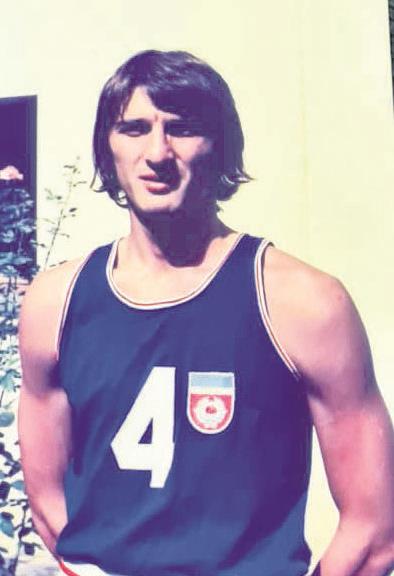
Football
You played basketball at our school. A stroke of luck or not, I don’t know, but I had a teacher, called Kamidžorac, who taught physics and chemistry, and was a sports fanatic. He played table tennis, basketball, football, just about everything! He picked us tall guys to play basketball. I played fairly well. Before that I’d trained football – after all, it was the most popular sport, and Aca Trifunović was in my homeroom group. The two of us started training football. I trained for a year and played basketball in parallel. When I got to the eighth grade, there was a primary school basketball competition. It was all very well-organized, we got to the finals, and went to Belgrade. I was declared the best shooting guard, but we lost to a school trained by Bata Đorđević, father of Sale Đorđević.
What do you mean – basketball?
So we were on our way back to Kraljevo, and that’s when they started putting pressure on me to train basketball and stop training football. I didn’t want to, football was closer to my heart. That’s where Kamidžorac, our teacher, entered the scene and blackmailed me, saying that he’d give me two ‘F’s and send me to remedial classes if I didn’t start to train. And that’s how it all started, by and large. I was about 14.
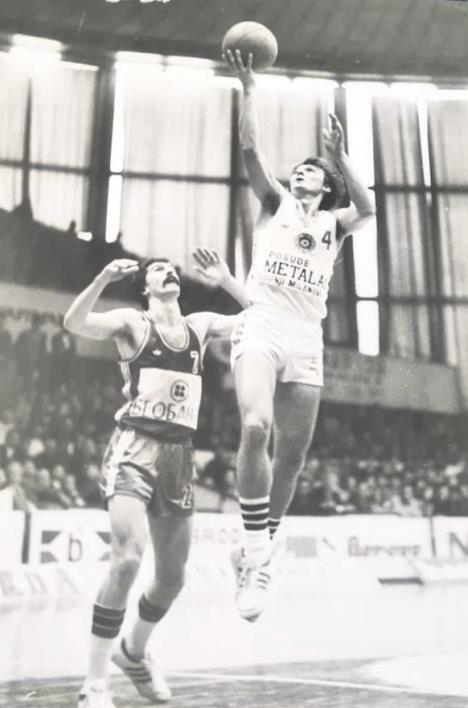
What now?
At 15, I got into the Sloga BC’s first team. It was summer and we played in the second league. We had the first match with Ivangrad BC and the coach, Slavko Petrović, put me in the starting lineup. I scored 15 points, and that’s when my career actually took off. Then we had to do some preparations. It was 1971, and I was in year two of my secondary school. That summer, the European Junior Basketball Championship was held in Gorica. Before heading out to the preparations in Rijeka, I had a couple of ‘F’s. I needed my parents’ permission. “How’s the school going? How many ‘F’s do you have?” my father asked me. I told him I had the usual two – in Russian and English – and that I’d take the exams in August. My goal was to be on that bus – I was going to call him from Belgrade and tell him the truth. However, when I did tell him how many ‘F’s I had, he started yelling at me saying that I needed to come back home immediately. For me, this was a chance of a lifetime, and I ignored his words.
Red Star supporter
I’ve never hidden the fact that I supported Red Star as a child. My father was a Red Star supporter and that was perfectly normal. My idol and a man who had brought me closer to playing basketball was Duci Simonović. The Red Star legend. I often watched him train. It was evident that I had outgrown the environment I was in – I was getting calls from Cibona BC, Belgrade YBC, even Red Star. Partizan wasn’t calling… I didn’t want to go to Zagreb because I started going steady with my wife-to-be, who was from Kraljevo, so it was too far away. I took up Red Star’s offer.
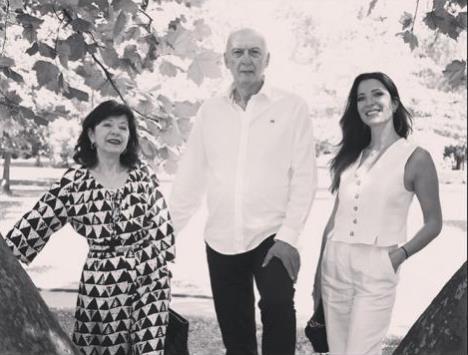
The school trip
One of the reasons that I accepted it quickly was the school trip. We were supposed to go to Athens – my first trip with my girlfriend. My father was strict about such things, he was like, “Ask you mom if she has some money to give you,” so she gave me 50 DM, for water only. So, in order to be a cool guy, I signed a pre-contract with Red Star. They gave me 3,500 DM, which was a lot of money back then, and I could buy a car. I went on a seven-day school trip and, when I returned, I didn’t have a penny to my name. That’s when problems started.
Just hanging up the laundry
I realized I’d made a mistake. Red Star was a champion then and a strong team, especially regarding the position I played. They had Moka Slavnić, who was untouchable, Duci Simonović, Rakočević... I’d have been fourth in line, and if I went there, I knew I wasn’t going to play. This youthful recklessness got me into a lot of trouble. However, Lady Luck smiled on me. Mirza Delibašić, who was supposed to come to Partizan BC, stayed in Bosnia – politics had interfered there. That’s where I entered the scene. However, they didn’t know that I’d signed a pre-contract. I remember, Sloga BC was playing a sort of a championship match with Partizan BC in Kraljevo. Zečević and the late Đukić arrived in my backyard before the match. And me? I was putting up laundry at that moment. They asked me, “Hey, kid, does Todorić live here?” I said it was me and that I was coming as soon as put up the laundry. It was hilarious – the guys came to pick up a player, and there I was, putting up laundry. What can you do?
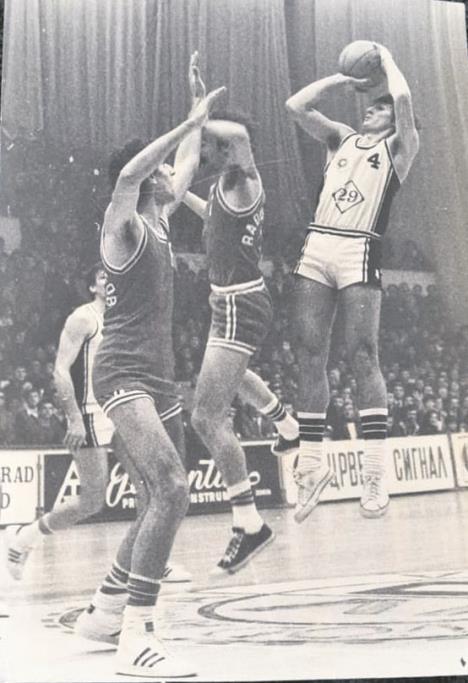
Start packing!
At that game, I scored 35 points against Partizan for Sloga BC! And it was a championship match – losers were eliminated. So for the last two minutes, they were chasing me around the court asking me not to score. They were yelling, “Kid, you’re supposed to transfer to us, and you want to eliminate us?” After the game, I was notified that they wanted me in Partizan BC and that they wanted to make a deal with Red Star. A few days later, they came to pick me up, around 11.30 pm. I was already in bed because I had school on the following day. They woke me up, and my mother asked me if I wanted to play for Partizan BC. I said I did, I put my stuff in my bag, and my father was gobsmacked. He was a loyal Red Star supporter, as I told you. He said that I was not to come back to the house, or something to that effect. He was very offended. I couldn’t come home for three months, nor had I heard from him, until it blew over a bit.
Partizan BC supporter
I didn’t become a supporter immediately. Far from it! For a year I was on a sort of a fence – supporting Red Star in football, and Partizan in basketball. The then coach, Ranko Žeravica, loved football. He would often let us play. He took us to a derby. Aca Trifunović had already gone to Partizan at that point. The whole team went to the Rajko Mitić Stadium, to the west bleachers. In the first half, Partizan’s Aca Trifunović scored the goal. As soon as he did, I jumped with joy. It was a trigger that made up my mind. It was only a matter of time.
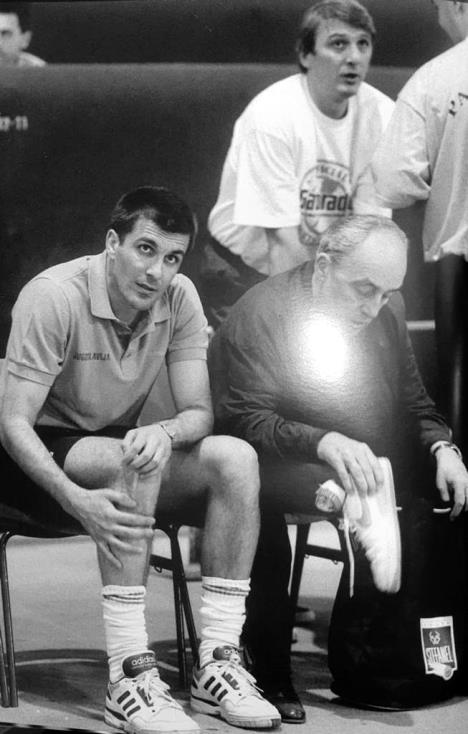
What then?
I think I’m the second oldest player in terms of the years spent at Partizan BC – I played for 12 years. During that time, I played over 300 official games – you’ll find the exact information somewhere, I’m not completely sure myself. You couldn’t make a lot of money in basketball in my time. You couldn’t be all set just by playing ball. Our generation had to finish some schools, unlike today’s generations. Back then, you had to be ready for the life after sport.
Sloga BC
There was a rule that you couldn’t leave a club until you were 28. You could leave earlier provided two clubs reached an agreement. A player had no rights. So I graduated from the college of economics and did my military service. I gave a lot of thought to what was going to happen to me in the future. I spent another year at Partizan BC and then received a call from Kraljevo – they were making a team. When I completed my military service, it wasn’t the same. I‘d put on weight, loosened up, and younger players had arrived at the scene. I wasn’t aiming to be on the team but to play. I realized that I was going to be a reserve player at Partizan BC, so I accepted the offer to play in Kraljevo. We got into the first league. For me this meant the end of my career as a player. I was only 30.

A player retiring
In the meantime, when I played for Kraljevo BC, I made an agreement with Zečević, who was the Secretary General of the Partizan Sport Society. He created the first marketing service. I started to work there while playing for Sloga BC. I trained with Partizan BC and went to Kraljevo only when there was a match. When my job was done in Kraljevo, I retired from basketball. However… Back then, my wife worked at a tourist agency, and a colleague of hers, who was in the Belgrade YBC management, kept insisting that I play with them. So I did. I played at the YBC for a year and worked in Partizan BC marketing too. I was born to do that job, everybody was shocked by what contracts I managed to conclude. But soon after, I got sick and tired of that job. I had no work hours – whenever they’d call, I’d have to go, and they’d call me virtually in the middle of the night. I told you that we didn’t play for a huge amount of money, and I was making the most money in marketing. I also had rent-a-car, bars, the whole thing, but I got sick of it, so I resigned.
The condition
I was hit hard when Kića ended his career around that time and started to manage Partizan BC. He offered me to join him; I did and have stayed there till now. But there was a condition, no matter that Kića and me had been friends all our lives. I had to bring Vlade Divac from Sloga BC to Partizan BC. Now, why me? I told you just now that I’d played at Sloga BC for one year. I played with Divac. He was the youngest on the team and really mischievous, and since I was the oldest, it was my duty to keep an eye on him. We had a great relationship. That was Partizan’s advantage, because he was chased by the whole of Yugoslavia.

The Divac case
I started to work on Divac’s transfer. During those several months, I spent more time in Kraljevo than Belgrade. Kića and me went to Kraljevo to talk to him, but never in the town – always in the neighbouring villages, to avoid being seen negotiating. We sat down at a village tavern, started talking and convincing him that it was best for him to be at Partizan BC. We finish the conversation, Vlade is silent and nodding, no words spoken, we don’t know what he’s thinking. An old-timer starts yammering from another table, “Well, sonny-boy, it’s best for you if you joined the Partisan Forces!” To cut a long story short, it was quite interesting, actually. You have lots of such situations described in the book – Black and White.

The start of the renewal
The race lasted for six months. Eventually, in February or March we managed to convince him to sign a pre-contract. It happened in a village near Kraljevo where my aunt had a house. I went outside for him and Kića to finalize the deal and it was so darn freezing. Divac was the key player for a new Partizan BC that Kića was building with us. The assessment was that the club that nabbed Divac would actually be the strongest and so lure other young players in. In addition to him, we had Saša Đorđević, Žarko Paspalj, and Ivo Nakić. They were top players. From that time onwards, Partizan was generally considered to be a club that helps young, up-and-coming players develop. It was the start of a renewal.
The club is a family
The point was to create a club that would be a family. It wasn’t about paying the player and having him around. Nothing comes of that. Ninety percent of the players who have left the club get in touch, congratulate us on our successes, come to see the games when they get a chance… All of us who have taken part in it are glad that we have managed to impose that sort of lifestyle. The club is a family, we need to be there for each other. My role wasn’t to take care of the players – it developed spontaneously. This one time, it was the eve of a holiday, my wife and daughter were chatting and wondering what our players were doing as we were celebrating. It all started with the French generation – Dallo, Joffrey, Westermann, Cummings as well… At any rate, it was customary every Christmas and Easter to have them over. It lasted a few years. They are still our house friends and great supporters of Partizan.
Half a century Partizan BC won the first title in 1976. I played that year. Since then I’ve been part of the club, and I’m the only one who’s been there when Partizan won all the titles. When I say this, it sounds fascinating, but I’ve spent half a century here, in good times and bad ones too. They always ask me which title is my favourite. I’ve given it a lot of thought and chosen a few. The first one I won as a Partizan player in 1976. That was the first title in the history of the club. Then comes the first title won, in a manner of speaking, when I was an official, in 1986. In terms of significance, probably the most valuable one was the 1992 Istanbul title. There were a few more, and you can say that each one was like this or like that, but the last title has a very special place for me. Partizan hadn’t been a champion for ten years, and my heart is full of joy seeing that we’re back on the scene. I’m the least deserving of it, because in recent years I’ve only been the president’s advisor and not in the forefront.

The brand
We’re always fighting and arguing over which club is better – Red Star or Partizan. The president of Red Star, who shall remain nameless, made a statement a couple of years ago to the effect that Partizan supporters were the Beer Fest or the Lav Festival in Vrnjačka Banja. That makes no sense. All of Europe knows what Partizan has achieved in basketball and what kind of supporters it has. I told you in the beginning that I’d been a Red Star supporter. That’s why I have no problem saying openly that Serbia has two brands, and they are Red Star FC and Partizan BC. Everything else takes the back seat.
The chickens have come to roost
I will get anxious over Partizan for as long as I live, and that’s just how things are. No one in this line of business cannot be fit as a fiddle health-wise. Over the years, I’ve trained myself, when I’m watching a game, to seem pretty calm, but there’s a storm raging inside. All the things you couldn’t see, the fact that I’d get anxious – you could say that the chickens have come home to roost in the past ten years. I’ve had some interventions, but it’s all turned out well, thank God. I walk ten kilometres every day, I watch what I eat, have regular checkups, and I can say with pride that now I’m really good health-wise.

Cigarettes
I’ve quit smoking too. Many players remember me by my cigarettes. My spot at Partizan was at the table. I’d mostly carry betting slips from the bookies under my arm, sit, fill the slips in, kill time, and smoke. Players would go to Dule Vujošević, mostly foreign nationals – our guys knew nothing would come of it – and say that they were bothered by the tobacco, that they couldn’t train. So, since we’d always had this sort of humorous relationship, Dule comes over and says that, say, Lazme’s told him that he minds my smoking and that he can’t train. To that I just retort that he can say something to me when he scores 30 jump shots, and that he’d better mind his game than my smoking. And so the story went on. I wasn’t smoking only when I was asleep. Dule was a very strict coach, so this one time we were on our way to Zadar, travelling for 12 hours, and I smoked all the way. He recognized my passion for tobacco, so I was allowed certain things.
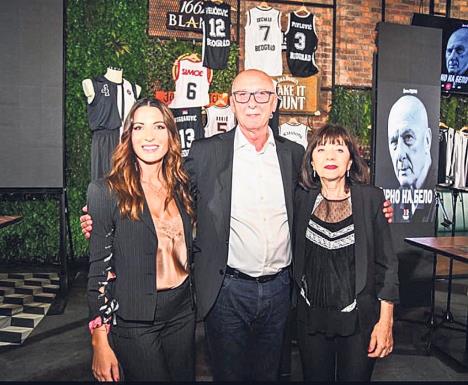
Vesna
I like to say that I met my wife Vesna back in kindergarten. We started to go steady in high school, in the third year of the preparatory school, about a month before I came to Belgrade. I’ve mentioned that Cibona BC was out of the question – well, it was because of her. My wife is the most ardent Partizan supporter. Our daughter once went with her to see a game at the Pionir Sports Arena. She came over to me afterwards and said, “Dad, I’m not going to watch games with Mom anymore.”
Tijana
My angel with blue eyes and locks. She’s filled up my life. My pride and joy to the present day. My daughter Tijana. She and my wife are my greatest treasures. You’re nothing without a family. You can’t have a serious job and be doing it right if you have problems at home.
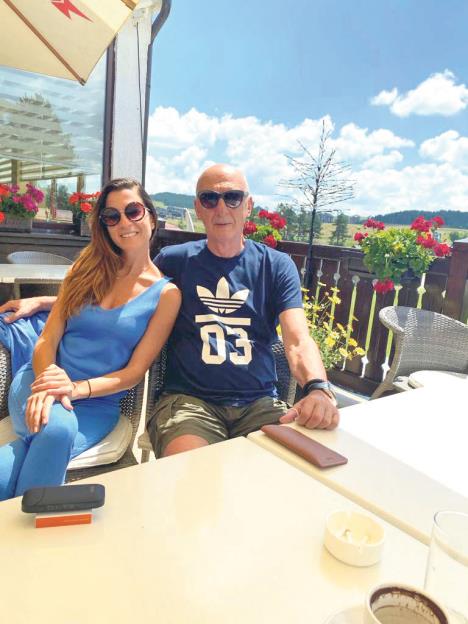
She didn’t live to see it
Your closest family members passing is inevitable, but if it’s untimely, then the grief is much more profound. That was the case with my mother. I loved her very much – I was a Momma’s boy – and my brother was a Daddy’s boy. My mother Milica died very young, at 58, from the things I’ve just mentioned – problems with blood pressure, brain haemorrhage… The one good thing is that she didn’t suffer. I was also hit hard when my paternal grandmother passed away. When I was just a kid, she was the only one in the family to say that I would make good, that I would make it big in basketball. She’d see me off and greet me for a year, even at dawn – standing at the door and then hurrying into the kitchen to make me something to eat. She died just before Gorica and never lived to see her grandson bring her a medal.
I regret...
As for my job as an official, I have no regrets, I think I made some great deals and significant contributions to the club. I’ve never wanted to be in the limelight, so this book – Black and White, published by Vukotić Media – was aimed more at recording the history of the club than my own personal history. I haven’t given interviews for years or shown up in the media. My only regret is my career as a player – I don’t think I have achieved enough. What’s left is the sense of pity that I’ve never played for the national team. I blame myself for that.

Don’t conjure it up
As the years go by, people start thinking about certain things – whether their lives could have gone this way or that. I’ve never thought of death as such. It is bound to come anyway. But I’m still sort of superstitious regarding these things and don’t think you should talk or think about them. I’m telling you this at a time when a great tragedy has happened. Our Dejan Milojević is no longer with us. We had an exceptional relationship, and he was a great friend. He was barely 47, and now he’s just gone. So, what can I say about life? Today you’re here, and tomorrow you’re gone. If you’ll excuse me now, I have to go, Partizan awaits. See you at the Arena.
Recorded by Andrijana Stojanović









